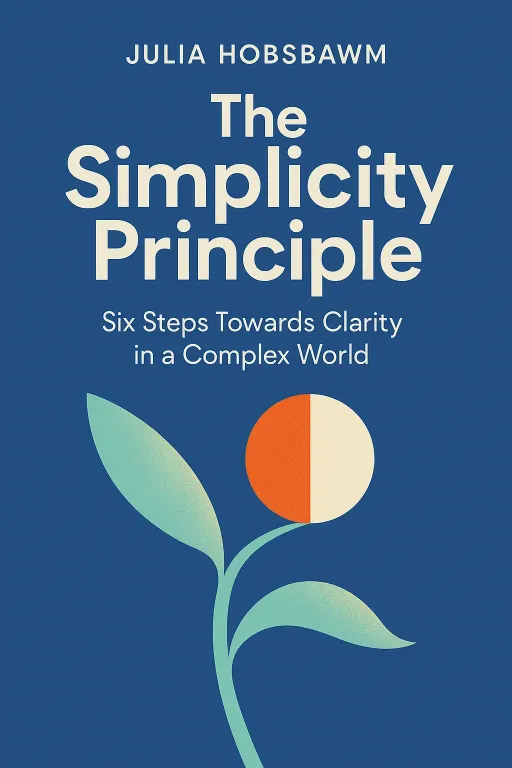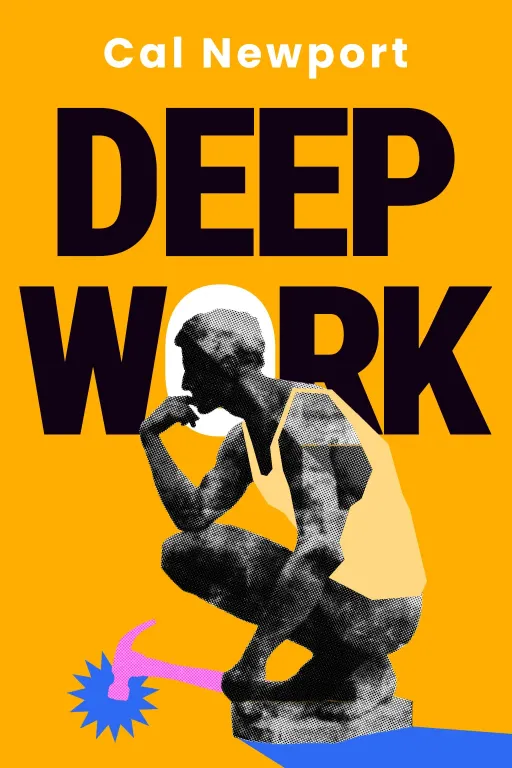
Escaping the Complexity Trap
10 minGolden Hook & Introduction
SECTION
Mark: A quick check of your phone feels harmless, right? But research shows that every time you get distracted, it takes over 23 minutes to fully regain your focus. That's not a small leak in your productivity; it's a firehose. Michelle: Hold on, 23 minutes? For one little email check? That can't be right. That's half my lunch break gone, just from glancing at a notification. If that's true, most of us are operating at a fraction of our mental capacity all day long. Mark: Exactly. We're living in a state of perpetual cognitive whiplash, and we've just accepted it as normal. It’s this exact problem that author and social entrepreneur Julia Hobsbawm tackles in her book, The Simplicity Principle: Six Steps Towards Clarity in a Complex World. Michelle: Julia Hobsbawm… I know that name. She’s highly respected, right? I think she was even awarded an OBE for her work in business. That gives her some serious credibility. She’s not just a theorist; she’s been in the trenches of the modern workplace. Mark: Absolutely. And she published this book in April 2020, which feels incredibly prescient. Just as the world was forced into a massive, unplanned experiment in digital-first living, she delivered a manual on how to survive it. Michelle: Okay, so if we're all living in this state of constant distraction, this cognitive whiplash as you call it, what's the real damage? It feels bad, but Hobsbawm must have a name for this modern condition.
The Complexity Trap: Why Our Brains Crave Simplicity but Create Chaos
SECTION
Mark: She does, and it’s brilliantly simple. She calls it the "CAT" syndrome. It stands for Complexity, Anxiety, and too little Time. It's the toxic feedback loop of the 21st century. The more complex our work gets, the more anxious we become, and the less time we feel we have, which just makes us rush and create more complexity. Michelle: CAT syndrome. That’s perfect. It really does feel like we’re being hunted by our own to-do lists and inboxes. But is this just a feeling, or does this over-complication have real, tangible consequences? Mark: It has terrifyingly real consequences. Hobsbawm brings up one of the most tragic examples of recent years: the two Boeing 737 MAX crashes that killed 346 people. Michelle: Wow. I remember that. It was devastating. How does that connect to the idea of simplicity? Mark: It's a direct result of complexity gone wrong. The short version is that Boeing needed a quick, fuel-efficient update to their 737 to compete with Airbus. Instead of a full redesign, they put bigger engines on the old frame. This changed the plane's aerodynamics, making it prone to pitching its nose up. Michelle: Okay, a classic engineering problem. Mark: Right. But the solution was where the complexity trap snapped shut. They created a piece of software called MCAS to automatically push the plane's nose down if it got too high. It was meant to be a seamless, invisible fix that pilots wouldn't even need to be trained on. Michelle: Oh, I think I see where this is going. An invisible system that pilots don't know about sounds like a recipe for disaster. Mark: Precisely. A single faulty sensor could trigger the MCAS system, which would start pushing the plane's nose down, fighting the pilots. The pilots, with very little training on this new system, had no idea why the plane was trying to dive. They were literally fighting a ghost in the machine. The system designed to make things simple and safe created a complex, fatal scenario that human pilots couldn't override in time. Michelle: That's chilling. It's the ultimate example of a 'solution' being more dangerous than the original problem because it was too complex and too hidden. It wasn't simple at all. Mark: It's the perfect, tragic illustration of what Hobsbawm calls the "complexity bias." We have this built-in inclination to add more, to create intricate solutions, believing they're more robust. But often, they just introduce more points of failure. Michelle: So what's the antidote to this? If our instinct is to make things complicated, how do we fight it? Mark: Hobsbawm champions a very old principle, but with a modern, kinder twist. You’ve probably heard of KISS – Keep It Simple, Stupid. Michelle: Yeah, a bit harsh, but I get the point. Mark: Well, Hobsbawm shares a wonderful story about the poet Maya Angelou, who she worked with in the 80s. Angelou had her own version. She said the "stupid" part was vulgar. Her principle was "Keep It Simple, Sweetie." Michelle: Oh, I love that. It takes the judgment out of it. It’s not about being dumb; it’s about being kind to yourself and to the people who have to use what you create. It’s about clarity and grace. Mark: Exactly. It reframes simplicity from a command into an act of empathy. And that’s the philosophical core of the book. But of course, a nice mantra isn't enough to fix a complex world. Michelle: Right. 'Keep It Simple, Sweetie' is a great mantra, but it's a bit abstract. How do you actually do it? You can't just tell a Boeing engineer to 'keep it simple.' There has to be a system, a framework.
Hexagon Action: Learning from Nature's Perfect Organizer
SECTION
Mark: And that's where Hobsbawm introduces her central, brilliant idea: The Hexagon Action framework. She argues that to fight man-made complexity, we should look to nature's genius for simplicity and strength. Michelle: A hexagon? Like from a beehive? Why that shape? Mark: Because, as she points out, the hexagon is one of nature's most perfect shapes. It's incredibly strong and efficient. When bees build their honeycomb, the hexagonal cells use the least amount of wax to hold the most amount of honey. They tessellate perfectly, meaning they fit together without any gaps. There's no wasted space. It's a shape that stands for connection, stability, and efficiency. Michelle: Okay, that’s a beautiful metaphor. So the hexagon is like a blueprint for a balanced life? Each side is a load-bearing wall, and if one is weak, the whole structure gets wobbly. Mark: That's a perfect way to put it. Hobsbawm identifies six sides to her Hexagon of Simplicity. These are the six core areas we need to manage to cut through the chaos. They are: Clarity, Individuality, Reset, Knowledge, Networks, and Time. Michelle: Clarity, Individuality, Reset, Knowledge, Networks, Time. It’s a comprehensive list. It covers everything from your mindset to your schedule to your relationships. Mark: It does. And the idea isn't to perfectly master all six at once. It's to use the hexagon as a diagnostic tool. To look at your life and ask, "Which side is feeling weak right now? Where is the complexity creeping in?" Maybe you have your networks sorted, but you have no time for 'Reset'. Or you have plenty of time, but no 'Clarity' on what to do with it. Michelle: I can see how that would be useful. It breaks an overwhelming problem—'my life is too complicated'—into six manageable chunks. But I have to ask, the book won awards, but some readers found it a bit intellectual. Is this hexagon model something anyone can use, or do you need a PhD in geometry to figure it out? Mark: That’s a fair question, and I think that’s where the beauty of the bee analogy comes in. Hobsbawm constantly brings it back to nature. She quotes this wonderful line: "The best bee in the world can teach only what she herself knows." The point is that this isn't about abstract, academic theory. It's about observable, practical wisdom. Michelle: So how do we 'be the bee' in our own lives? What does foraging or pollinating look like for someone staring at a spreadsheet? Mark: Well, 'foraging' is about seeking out the right knowledge and connections—not just consuming everything. 'Dancing' is about communicating with clarity—sharing what you've learned effectively with your network, your 'hive'. And 'pollinating' is about creating value, about taking ideas from one place and using them to create something new and fruitful somewhere else. It’s about action, not just thinking. Michelle: I like that. Forage, Dance, Pollinate. It turns this geometric concept into a set of verbs, into something you can actually do. It’s a simple set of instructions for a complex world. Mark: And that’s the whole point. The hexagon isn't meant to be a rigid cage. It's a honeycomb. A structure to hold the sweet stuff—the things that give your life and work meaning—while protecting it from the chaos outside.
Synthesis & Takeaways
SECTION
Michelle: So, when we strip it all away, what's the one thing we should remember from this? It feels like more than just 'get organized.' Mark: It is. I think the deepest insight is that our modern world is now actively, commercially, and technologically designed for complexity. Distraction is profitable. Confusion is a business model. And in that environment, simplicity is no longer a passive preference. It has to be an active, conscious, and strategic choice. Michelle: It's a form of rebellion, almost. Mark: It's a form of self-preservation. Hobsbawm points to the fact that by 2021, the internet was creating over 3.3 zettabytes of data. A zettabyte is a trillion gigabytes. Our brains were not built for that. The Hexagon Action framework isn't just a cute organizational tool; it's a shield. It's a personal filtering system to protect our finite attention and humanity from an infinite firehose of complexity. Michelle: A shield. I like that. It feels empowering. So, for someone listening who feels completely overwhelmed by the 'CAT' syndrome, what's a practical first step? Mark: Don't try to build the whole honeycomb at once. Hobsbawm's approach is all about small, simple actions. Michelle: Maybe the first step is just to pick one side of the hexagon that feels most out of balance. For a lot of us, I bet it's 'Reset'. Just focusing on that for one week—actually scheduling time to do nothing, to power down—could be revolutionary. Mark: That's a perfect starting point. Just choose one side and take one small action. That's the Simplicity Principle in practice. Michelle: For our listeners, we'd love to know which of the six sides—Clarity, Individuality, Reset, Knowledge, Networks, or Time—resonates most with you right now. Where do you feel the complexity creeping in? Let us know. It’s a conversation worth having. Mark: This is Aibrary, signing off.









